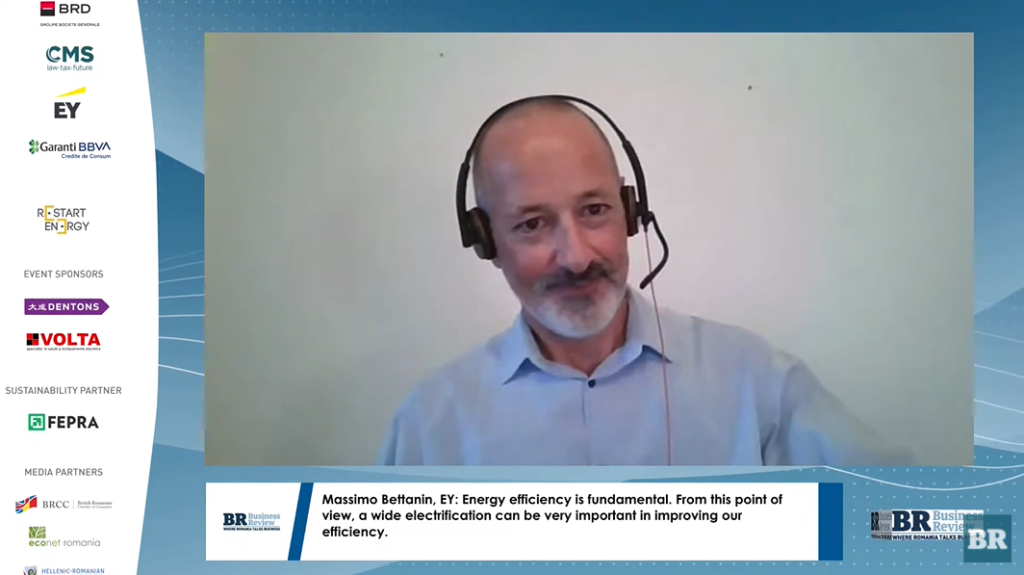Present at BR’s recent Environmental & Sustainability Summit, both as a keynote speaker & a panelist, Massimo Bettanin, Partner, EY Climate Change & Sustainability Services in Central and Eastern Europe, sat down with Business Review for an exclusive post-event interview in which he emphasized the points he made during the summit.
Download the “Net Zero Pathway and the (EU) Power Sector” presentation featured in Massimo Bettanin’s keynote speech HERE.
Business Review: The EU set up an important reduction in CO2 levels for the coming years. Are we, in Europe, able to touch those levels?
Massimo Bettanin: EU did pretty well so far and met previously proposed target (ie -20% by 2020) ahead schedule. EU estimates indicated a -32% by 2030 (current and planned reduction measures) which is clearly not enough if we want to achieve a -55% reduction. This will require additional efforts and resources and more significant reductions in the transport and difficult-to-abate sectors. However, considering what we managed to achieve so far and the commitment demonstrated by the EU Commission and Parlament so far, we can be reasonably confident that the EU has a good chance to achieve the new more ambitious targets.
Watch Massimo Bettanin’s “Towards Net Zero Economy: an Opportunity for the Power Sector?” Keynote Speech
BR: Are we in Romania able to make those CO2 targets?
MB: Romania is in a very good position to achieve the CO2 targets. As per Integrated National Energy and Climate Plan a 50% reduction vs. 1990 was targeted by 2030 (page 49). This plan was approved before the Green Deal at 10% above 40% initial EU target. The plan will need to be updated as a result of the Green Deal.
Also, Romania is the top EU country dependent on coal/ lignite for electricity production. Phasing out lignite has significantly contributed towards the CO2 reductions and will continue to contribute towards the goal. The Recovery and Resilience Fund approved recently has clear milestones for lignite phasing out.
“A viable net-zero pathway exists and if implemented properly will create millions of job opportunities. This requires the mobilization of huge resources. It’s probably the biggest challenge of humankind.” Massimo Bettanin said during BR’s #ESS2021.
BR: What is the most important thing that an economy or society as a whole must do in order to reduce CO2 levels?
MB: There is not just one single silver bullet. However, this very challenging goal can be achieved through a number of programs focusing on (1) creating awareness and a sense of urgency at all levels of the society (support and participation from citizens is crucial to trigger different behaviours and expectations), (2) rules and regulations to support and drive new virtuous behaviours in the business environment and also financial markets (the CSRD is a good example in this direction), (3) increasing energy efficiency in all sectors from vehicles to buildings and agriculture and embedding energy/carbon parameters in design, procurement, production, transport, etc., (4) decarbonizing the energy production and increasing electrification (as mentioned during the presentation), (5) facilitating the cooperation/knowledge sharing between the different players and stakeholders.
BR: What do we, as an economy and society, need in order to have a sustainable energy production?
MB: According to the recent report from the IEA, in order to achieve a net zero in the energy sector by 2050, we must (1) stop investing in new fossil fuel supply projects (fossil fuel from 4/5 today to 1/5 by 2050), (2) scale up renewables (2/3 of energy should be renewable by 2050 and electricity should provide 50% of energy consumption), (3) invest in breakthrough technologies (i.e. batteries, green hydrogen, CO2 capture and use, etc.), (4) retrofit the existing coal power plants with abatement system and (5) monitor, report and chase after anyone that does not head in this direction.
BR: Through all these changes, will we be able to stop climate change?
MB: The scientists recently confirmed (e.g. last IPCC report) that we can have a reasonable chance to limit the temperature increase to 1.5-2oC providing we act now and mobilize significant resources to accelerate the transition. The next decade will be fundamental as the decisions we take today, particularly those related to infrastructures and energy systems, will display their effects for 30-50 years. Certainly, with the emissions that have happened to date, (i) we have set climate change in motion, (ii) we will continue to experience the impacts of the CO2 that is currently in the atmosphere for decades to come (unless it is removed in some way in the coming years), and (iii) any additional CO2 that we continue to emit and add to the atmosphere (and oceans) from now on will only serve to further increase the severity of climate change impacts in the coming years (fires, droughts, flooding, heatwaves, biodiversity collapse, migration of animals and people, supply chain breakdowns, etc). This is an issue that is going to stay and it will become more and more serious.


:quality(80)/business-review.eu/wp-content/uploads/2021/10/SNIPPETS_ESS_massimo-bettanin.jpg)

:quality(80)/business-review.eu/wp-content/uploads/2024/04/AnaMaria_Voicu_Domsa_EYRomania.jpg)





:quality(80)/business-review.eu/wp-content/uploads/2024/02/IMG_6951.jpg)

:quality(80)/business-review.eu/wp-content/uploads/2024/04/COVER-1.jpg)



:quality(50)/business-review.eu/wp-content/uploads/2024/03/Screenshot-2024-03-13-at-1.31.16 PM.png)
:quality(50)/business-review.eu/wp-content/uploads/2024/01/Mihai-Draghici_EY-Romania.jpg)
:quality(50)/business-review.eu/wp-content/uploads/2024/02/Gelu-Gherghescu.jpg)
:quality(80)/business-review.eu/wp-content/uploads/2024/04/cover-april.jpg)
:quality(50)/business-review.eu/wp-content/uploads/2024/04/Slide1.png)
:quality(50)/business-review.eu/wp-content/uploads/2024/04/1_Transport.jpg)
:quality(50)/business-review.eu/wp-content/uploads/2024/04/0x0-Supercharger_18-scaled.jpg)